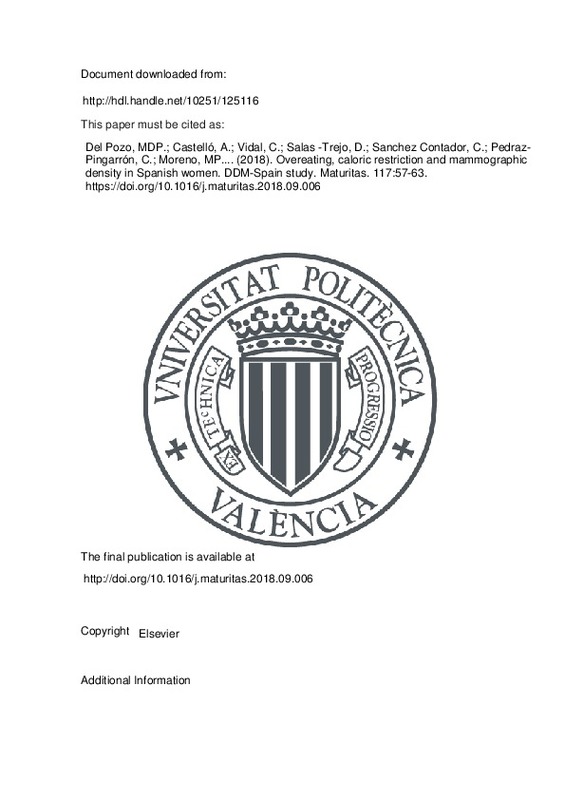Del Pozo, MDP.; Castelló, A.; Vidal, C.; Salas -Trejo, D.; Sanchez Contador, C.; Pedraz-Pingarrón, C.; Moreno, MP.... (2018). Overeating, caloric restriction and mammographic density in Spanish women. DDM-Spain study. Maturitas. 117:57-63. https://doi.org/10.1016/j.maturitas.2018.09.006
Por favor, use este identificador para citar o enlazar este ítem: http://hdl.handle.net/10251/125116
|
Título:
|
Overeating, caloric restriction and mammographic density in Spanish women. DDM-Spain study
|
|
Autor:
|
del Pozo, Maria del Pilar
Castelló, Adela
Vidal, Carmen
Salas -Trejo, Dolores
Sanchez Contador, Carmen
Pedraz-Pingarrón, Carmen
Moreno, María Pilar
Santamariña, Carmen
Ederra, María

 Llobet Azpitarte, Rafael
Vioque, Jesús
Perez Gómez, Beatriz
Pollán, Marina
Lope, Virginia
Llobet Azpitarte, Rafael
Vioque, Jesús
Perez Gómez, Beatriz
Pollán, Marina
Lope, Virginia
|
|
Entidad UPV:
|
Universitat Politècnica de València. Departamento de Sistemas Informáticos y Computación - Departament de Sistemes Informàtics i Computació
|
|
Fecha difusión:
|
|
|
Resumen:
|
[EN] Objectives: Mammographic density (MD) is a strong risk factor for breast cancer. The present study evaluates the association between relative caloric intake and MD in Spanish women.
Study design: We conducted a ...[+]
[EN] Objectives: Mammographic density (MD) is a strong risk factor for breast cancer. The present study evaluates the association between relative caloric intake and MD in Spanish women.
Study design: We conducted a cross-sectional study in which 3517 women were recruited from seven breast cancer screening centers. MD was measured by an experienced radiologist using craniocaudal mammography and Boyd's semi-quantitative scale. Information was collected through an epidemiological survey. Predicted calories were calculated using linear regression models, including the basal metabolic rate and physical activity as explanatory variables. Overeating and caloric restriction were defined taking into account the 99% confidence interval of the predicted value. Odds ratios (OR) and 95% confidence intervals (95%CI) were estimated using center-specific mixed ordinal logistic regression models, adjusted for age, menopausal status, body mass index, parity, tobacco use, family history of breast cancer, previous biopsies, age at menarche and adherence to a Western diet.
Main outcome measure: Mammographic density.
Results: Those women with an excessive caloric intake ( > 40% above predicted) presented higher MD (OR = 1.41, 95%CI = 0.97-2.03; p = 0.070). For every 20% increase in relative caloric consumption the probability of having higher MD increased by 5% (OR = 1.05, 95%CI = 0.98-1.14; p = 0.178), not observing differences between the categories of explanatory variables. Caloric restriction was not associated with MD in our study.
Conclusions: This is the first study exploring the association between MD and the effect of caloric deficit or excessive caloric consumption according to the energy requirements of each woman. Although caloric restriction does not seem to affect breast density, a caloric intake above predicted levels seems to increase this phenotype
[-]
|
|
Palabras clave:
|
Breast density
,
Calories
,
Energy intake
,
Caloric intake
,
Basal metabolic rate
|
|
Derechos de uso:
|
Reconocimiento - No comercial - Sin obra derivada (by-nc-nd)
|
|
Fuente:
|
Maturitas. (issn:
0378-5122
)
|
|
DOI:
|
10.1016/j.maturitas.2018.09.006
|
|
Editorial:
|
Elsevier
|
|
Versión del editor:
|
http://doi.org/10.1016/j.maturitas.2018.09.006
|
|
Código del Proyecto:
|
info:eu-repo/grantAgreement/MINECO//PI15%2F00029/ES/Obesidad como factor de riesgo para el desarrollo de la enfermedad de Alzheimer. Implicación de la Aminoprocalcitonina como nueva diana diagnóstica y terapéutica/
info:eu-repo/grantAgreement/ISCIII//EPY1306%2F06/
info:eu-repo/grantAgreement/ISCIII//EPY-1169%2F10/ES/DENSIDAD MAMOGRÁFICA. SUSCEPTIBILIDAD GENÉTICA Y CÁNCER DE MAMA EN MUJERES DE ALTO RIESGO/
info:eu-repo/grantAgreement/ISCIII//PI15CIII%2F0013/ES/Ocupación, exposición laboral a agentes de riesgo, condiciones de trabajo y densidad mamográfica en mujeres españolas/DDM-Ocup/
|
|
Agradecimientos:
|
This study was supported by the Research Grant FIS PI060386 from Spanish Public Health Research Fund (Fondo de Investigacion Sanitaria); the Carlos III Institute of Health (Institute de Salud Carlos III)PI15CIII/0029 and ...[+]
This study was supported by the Research Grant FIS PI060386 from Spanish Public Health Research Fund (Fondo de Investigacion Sanitaria); the Carlos III Institute of Health (Institute de Salud Carlos III)PI15CIII/0029 and PI15CIII/00013; the EPY 1306/06Collaboration Agreement between Astra-Zeneca and the Carlos III Institute of Health; and a grant from the Spanish Federation of Breast Cancer Patients (FECMA EPY 1169/10).
[-]
|
|
Tipo:
|
Artículo
|







![[Cerrado]](/themes/UPV/images/candado.png)


